10.03.2024.Indian Untouchables News.collected by Sivaji and Team.chennai.600026.
Caste-murder bid: In-laws among six held for bid to kill Dalit youth in Tamil Nadu

The girl’s parents were arrested from Nilgiris on Thursday.
ERODE : Erode police on Friday arrested four people in connection with the ‘honour killing’ attempt on a Dalit youth near Bhavanisagar. The girl’s parents were arrested from Nilgiris on Thursday. The accused were identified as G Chandran, 57, and his wife Chitra, 41, who are the in-laws of the youth; and their relatives M Ammasakutti, 45, S Jagadeesh, 35, S Vadivel, 45, and S Karthi, 32, of Sathyamangalam. They were produced before the principal district court and remanded.
According to sources, J Subash, a Dalit resident from Guruvayurappan Nagar in Bhavanisagar was in love with Manju, a caste Hindu girl living in Gandhi Nagar in Sathyamangalam. But her parents Chandran and Chitra did not approve of the relationship.
On October 7, Subash married Manju. Chandran, who had been looking for his daughter, came to know about the marriage a week ago and was upset. On Wednesday, when Subash was taking his sister Harini, 16, on a bike to school, a truck knocked them down from behind. Harini died and Subhash is still in hospital.
Courtesy : TNIE
Library of Emancipation: How A Dalit Publisher In Maharashtra Is Creating An Inclusive Space For Marginalised

The ‘Library of Emancipation’ is Dalit writer and poet Yogesh Maitreya’s dream project- a place where people from marginalised communities can come and enjoy reading.
Abhik Bhattacharya
Stacks of books – neatly kept on a table – a small statue of Babasaheb Ambedkar, and blue windows letting the light pass through it – may seem to be a residential flat at a first glance. But this place, at Omkarnagar in Nagpur is soon going to be a space for reading, discussion, debate and emancipation. Situated around 7 kms away from the head office of RSS in Nagpur, the ‘Library of Emancipation’ is Dalit writer and poet Yogesh Maitreya’s dream project- a place where people from marginalised communities can come and enjoy reading.
Maitreya, who founded Panther’s Paw publication in 2016 that publishes books by Dalit-Bahujan authors, is using his office space to turn it into a library. “The idea of library of emancipation came to me when we were setting up an office space for Panther’s Paw in 2021 right after the second week of the pandemic,” says the scholar.
The major thought behind setting up the library in Nagpur, however, came from his own childhood experience. “I was reflecting on my own history and the history of the city of Nagpur where there is hardly any library. There is no space for students or anybody who does not have the financial means to buy books but who wants to cultivate their own mind by reading about it,” he adds.
Inside%20the%20%27library%20of%20emancipation%27%20in%20NagpurInside the ‘library of emancipation’ in Nagpur Photo: Yogesh Maitreya
Apart from 1970s and 80s when Dalits in the city tried to reclaim their histories through books, there have hardly been any such effort since. “The city is someway or other now engulfed in consumption,” says Maitreya. Every year during Vijaya Dashami, Dalits from across the state participate in huge numbers to celebrate the anniversary of Babasaheb. And the words of the father of the constitution, ‘educate, agitate, organise’ resonate through the efforts of Panther’s Paw.
Interestingly, Maitreya in his childhood rarely had any space where he could go and read. “I never had such space where I could read books. The life now has become virtual but the significance of reading books hasn’t reduced,” he notes. This indominable desire to create a space where people would come and read had made him think through such a project.
In early February, they started asking for contribution from people to build this library and had set a target of Rs. 3,25,000. They announced the project on their social media page and informed that they would sell four books titled A Rebellious Cobbler, Out of Coverage Area, Outside the Fold Singing and Thinking Anticaste at Rs. 2096 to gather the budget.
Notably, in a few weeks, they managed to gather the required amount and the library is about to start its operation in a few weeks, Maitreya notes. “At least 20-30 people will be able sit and read here. We have been arranging small talks and readings as well. We arranged a session recently to read a chapter from Bell Hooks’ The will to change. So, gradually it will also become a space for discussions and debate,” he adds.
Inside%20the%20%27library%20of%20emancipation%27%20in%20NagpurInside the ‘library of emancipation’ in Nagpur Photo: Yogesh Maitreya
There will be no membership charge for the library. Anybody who wants to donate books can donate it to their office address. “Everyone has one book in their life that made impact and changed something in them. People across class, caste and gender background can donate. We are keeping books on poetry, anthropology, literature, autobiography, feminism, anti-caste literature and history,” says Maitreya.
Coming at a time when the percentage of Dalit publishers and authors was rare in comparison to the upper castes, Panther’s Paw tried to bring a positive change. In 2017, a study showed that among 90,000 books published in a year from India, only 150 or less than 0.5 per cent are written by Dalit authors.
To ensure that publishing is inclusive, Maitreya wants it to be a ‘public act’ where people are engaged beyond their capacity as reader. Library of Emancipation also holds similar essence. But why did he choose the word emancipation?
“What is emancipatory action for you depends on you but the books create stimulus. During Ambedkar’s life, people who were around him took his message to the corners of the society but after his mahaparinirvan, it is his books through which we can know him. Thus, reading becomes liberating and emancipatory,” says the author of Flowers on the grave of caste. The library will start its operation in a few days.
Courtesy : Outlook India
Home NewsUP SHOCKER: Dalit Man Shot Dead By Brother-In-Law Over Inter-Caste Marriage In Bijnor Village

UP SHOCKER: Dalit Man Shot Dead By Brother-In-Law Over Inter-Caste Marriage In Bijnor Village
Brajesh, a Dalit, had married, Divya, a Saini (caste Hindu), a year ago in their native village in Bijnor district of Uttar Pradesh, triggering tension between their families.
Uttar Pradesh News: In a shocking incident of “honour killing” fueled by casteist sentiments, a Dalit man was shot and killed by his brother-in-law who was upset over his sister marrying the victim. According to the police, the victim, Brajesh, was shot dead by his 26-year-old brother-in-law, Lavsit on Friday night in a village of Bijnor district in Uttar Pradesh.
Giving details, a senior police officer said that Brajesh, a resident of Mirpur Khadar village under Chandpur Police Station jurisdiction, had married his girlfriend Divya, around a year ago, despite the girl’s families objecting to the union.
Brajesh belonged to the Dalit community, while Divya is a Saini, a caste Hindu, and the marriage had triggered tension between their families, said Superintendent of Police Neeraj Kumar Jadaun.
On Friday night, Divya’s brother Lavsit, who was accompanied by several accomplices, waylaid Brajesh in the village market and shot him dead, the SP said, adding that seven people have been booked in the case and Lavsit has been arrested.
Police have launched searches to arrest the remaining accused, the officer said, adding that further investigation in underway.
The incident is yet another eerie reminder of caste-based discrimination still prevalent in many parts of the country, especially rural India, even in this modern day and age.
Girl burned to death by family for marrying Dalit
Earlier this year, a 19-year-old girl was allegedly burned to death by her own family members, including her father, days after she married her Dalit boyfriend against the family’s wishes. The incident took place in Thanjavur district of Tamil Nadu, police said.
According to details, the deceased victim, Aishwarya was in love with Naveen– both 19 years of age, since childhood as both had been friends since their childhood days and later worked together in Tiruppur.
Naveen– a mechanical engineer by profession, had landed a job at a hosiery unit in Avarapalayam, Tiruppur, while Aishwarya worked at a textile mill in Palladam. However, Aishwarya soon joined her boyfriend as she got hired at the same firm.
The childhood friendship blossomed into love and the couple were in a relationship for 18 months before finally deciding to get married. However, Aishwarya– a caste Hindu, knew her family would never agree to the match as Naveen belonged to the Dalit community.
Fearing stiff resistance and repercussion from Aishwarya’s family, the couple, with the help of their friends got married without their families’ knowledge on December 31, 2023 at a temple in Avarapalayam and moved into a rented accomodation in Veerapandi in Theni district.
Burned alive by family
When Aishwarya did not return home for a couple of days, her parents filed a filed a missing complaint with the Palladam Police. The cops traced her to the couple’s rented home in Theni and informed Aishwarya’s parents, who then took her back home on January 2.
The very next day, on January 3, Aishwarya’s husband, Naveen was shocked to learn that his wife had passed and had been cremated. Upon inquiring on his own, Naveen found out that Aishwarya had allegedly been burned alive by her own family members who were upset at her for marrying a Dalit man.
On January 7, Naveen filed a complaint at Vattathikottai Police Station, alleging that Aishwarya had been murdered by her family and secretly cremated. Reports claimed that Naveen waited four days to file a complaint as his life was in danger.
Courtesy : India.com
Rajasthan: Police Search Missing Dalit Woman at Complainant’s Expense, Celebrate Success with Booze

After recovering the woman safely, the search party, which did not have any female officials, celebrated the success at the complainant’s expense.
Abdul Mahir
Jaipur: It has often been observed that policemen often tarnish their image themselves and put their department in the dock. In Rajasthan, khaki (the colour of police uniform) has been tainted with the allegation of demanding money for searching a missing Dalit woman.
The incident in question has been reported from Ajmer district where the police allegedly asked the complainant to arrange a vehicle for them and bear the fuel and food expenses.
The cops did not stop here only. After accomplishing the mission, they celebrated their success by organising a liquor party on the complainant’s expenditure.
Ajmer Superintendent of Police Devendra Kumar Vishnoi confirmed unprofessional acts of the policemen, saying the accused — Head Constable Suresh Chand Meena and Constable Gauru (both of whom were posted at Madanganj Police Station) — have been suspended.
“An investigation into the allegations against the police team is underway,” he said.
A married woman from Madanganj police station area suddenly disappeared from a hospital recently. The brother-in-law of the woman had lodged a missing report in the police station. Acting on the complaint, a police team, comprising the two men, was sent in search of the woman.
After the policemen asked the complainant to provide them a vehicle, he took them to the possible location in his personal vehicle.
While returning after recovering the woman from Jaipur, the two men in uniform stopped at a dhaba (roadside eatery) on the highway to celebrate the success at the expense of the complainant.
They consumed liquor and had dinner. While celebrating, they made the complainant sit in the vehicle to keep an eye on the woman.
The complainant recorded the act, using his cell phone camera, and shared the video footage with the SP. He later filed a complaint in this regard.
Considering the conduct of the policemen as unprofessional, the top cop suspended both of them with immediate effect. However, they were later reinstated and are performing their duty.
Ironically, no female official was accompanying the search party. After it was brought into the notice of SP, another team comprising a woman constable was dispatched.
This is not the first when such an incident has come to light. Videos, involving such unprofessional or rather indecent police acts, often grab headlines.
Advocate Satish Kumar, associated with the Dalit Rights Center, asserts that according to regulations, the presence of a female police officer is mandatory during the interrogation or arrest of any woman, but there has been a lapse in compliance by the Madangunj police.
He further highlights that not only was there negligence in this regard, but also, the search was held at the expense of the Dalit complainant, which is entirely unjust. He emphasizes the need to investigate police officers who engage in corrupt practices by accepting money from complainants and conducting their duties improperly.
-Story Translated by Tarique Anwar
Courtesy : The Mooknayak
Karnataka Cong infighting: Dalit CM demand raised to checkmate Dy CM Shivakumar

Just ahead of the Lok Sabha elections, infighting in the Congress has come to the fore in Karnataka following a demand being raised for a Dalit Chief Minister.
Written by:IANS
Just ahead of the Lok Sabha elections, infighting in the Congress has come to the fore in Karnataka following a demand being raised for a Dalit Chief Minister.
Party sources said that the demand was made to checkmate all attempts by Deputy Chief Minister and state Congress President, DK Shivakumar, to stake claim to the CM’s post for a 2.5-year term.
Dy CM Shivakumar’s camp is in a jubilant mood following the quashing of the ED case against him by the Supreme Court.
The crowd is already raising “DK Shivakumar future CM” slogans much to the chagrin of Chief Minister Siddaramaiah and his camp.
Sources said that it is almost certain that Dy CM Shivakumar will stake claim for the CM’s post and in an attempt to avoid any such development, the close associates of CM Siddaramaiah, who are Cabinet ministers, have raised the demand for a Dalit CM if there is a change of guard in the state.
Minister for Cooperation, KN Rajanna and Minister for Social Welfare, Dr HC Mahadevappa have voiced their support for a Dalit CM for Karnataka.
Senior Congress leaders explained that undoubtedly, Dy CM Shivakumar has gained an upper hand following the quashing of the ED case against him.
The CM Siddaramaiah camp, that always maintained that Dy CM Shivakumar could be put behind bars at any time and that would cause irreparable damage to the party, has now lost its main defence.
Significantly, CM Siddaramaiah had not given a Cabinet berth to the leader during his first tenure in 2013 for two years by citing graft charges. However, Dy CM Shivakumar has always maintained that there were no corruption charges against him and he was charged with money laundering.
Following the quashing of the ED case, CM Siddaramaiah can’t play the corruption card now, sources said.
Another close associate of Dy CM Shivakumar said that the leader’s commitment to the party even after he was jailed and his stand to remain in the Congress party will bear fruit for him now.
Former CM, BS Yediyurappa had made an open offer on the floor of the House to him by stating that he would never become the CM if he remained in the Congress party.
Dy CM Shivakumar had stated then that he was given two choices, one to join the BJP and another to go to prison and he chose the latter.
Dy CM Shivakumar’s camp also explained that south Karnataka districts, considered as the bastion of the Vokkaliga community shifted towards the Congress party as Dy CM Shivakumar was projected as one of the CM candidates.
Dy CM Shivakumar has taken the Lok Sabha elections seriously and it is going to be another litmus test for him. If he gets the desired results, he is going to stake claim for the CM’s post authoritatively, sources said.
Political analyst Rudrappa Channabasappa told IANS that following the quashing of the ED’s case, Dy CM Shivakumar has got a shot in the arm to claim the CM’s post.
Two weeks ago Congress MP, DK Suresh, maintained that his brother Dy CM Shivakumar was going to become the CM.
However, CM Siddaramaiah, known for his political strategies, is not likely to leave the chair. His camp maintains that he commands the support of a majority of Congress MLAs.
CM Siddaramaiah had recently proclaimed that he would be the CM for the full term of five years.
Minister Rajanna had already stated he can’t be treated as a slave by the high command. It is being considered as a subtle warning to the top leadership not to disturb CM Siddaramaiah, sources said.
The high command, which is in no mood to lose one of the most prosperous and important states, is concerned about the developments.
Courtesy : TNM
- The Past is Never Dead by Ujjal Dosanjh
Review: The Past is Never Dead by Ujjal Dosanjh
A debut novel that packs in a good overview of Punjab’s caste history as it is transposed into the settlements of second and third generation Punjabis in the UK
About a decade ago, in the UK, I was confronted by fellow Indian students who did not appreciate my online advocacy for Dalit rights. Once, six of them, each from a different state of India and belonging to different castes – one a Brahmin, one a Sindhi, another a Gujarati Bania and so on – invited me to a mutual friend’s home, and then proceeded to bully me. I was shocked by their intense hostility. Thus far, they had been friends with whom I had dined, shopped, socialized, and shared conversations about longing to return to India. One, a Sikh, had been a close friend for a long time. I believed then that all Punjabis are open to other people and cultures. This was fated to be proved wrong, as she took offence to my anti-caste position in the classroom. Perhaps, it had nothing to do with her religion. Still, she grew excessively irritated with a Dalit man.


William Faulkner’s Requiem for a Nun has a sentence that reads: “The past is never dead. It’s not even past”. Ever since the novel’s publication, that sentence has been referenced numerous times in US Presidential speeches and Hollywood films, and even provided the title of a 2023 Faulker biopic. Lawyer, and occasional politician Ujjal Dosanjh’s debut novel, The Past is Never Dead, set in Punjab and the UK, and takes caste as its central theme, also draws from Faulkner’s phrase.
The protagonist, Kalu, who left Punjab at a young age, realises the hard way that he hasn’t escaped the old familiar social pressures completely even though he now lives in Bedford, UK. He wants to rent a large hoarding near Great Ouse Bridge and paint “Caste is never dead”. The Past is Never Dead, whose title rhymes with the words on Kalu’s banner, can be read as a dogged investigation, a work of communal self-reflection, and a bold statement on the status of the Indian diaspora. What made the protagonist reach such a conclusion? His wife, a Jatt, is murdered by her father for daring to marry the love of her life, a fellow Punjabi professor. A father killing his own daughter for marrying a Dalit is not uncommon in India but is unheard of in the western world except in the case of the murderous arson in Chicago in January 2008. In the novel, the father is shamed by his circle of “macho Jatt caste” friends who “taunted him as weak for not killing Simran immediately upon learning of her intention to marry Kalha”. The social pressure to maintain caste purity robs the father of humanity and he schemes to eliminate his daughter altogether.
The plot begins in Banjhan village in Punjab. Udho, who is a Chamar farmer, migrates to the UK and then brings over his wife, Banti, and son, Kalu. The child’s name is actually Kalha but villagers call him “Kalu Chamar”. Incidentally, “Kalu”, a derogatory reference to darker skin colour, is often used to address Dalits. After a death-defying escape from Punjab, Kalu reaches the UK, where he grows up. His first girlfriend is Christine, a white woman whom his conservative Punjabi mother dislikes. But Christine loves Kalu and has his back when he is mocked and disparagingly called a “rag-head cunt” for wearing a turban. Eventually, though, Kalu finds Simran, a doctor whose father is also one.The couple strive to have a beautiful family and raise their son, Angad, together in a world filled with love, laughter, and excitement. However, all this is crushed violently.
Largely set in Bedford, site of early anti-caste activism in the UK, the novel strikes you right from the get-go. It is also possibly the first book to be published out of Canada that has a Chamar protagonist, and exposes how the caste system is alive and well within the subcontinent’s diaspora. A Jatt himself, Dosanjh’s realisation that the template of caste is strongly ingrained, gives his novel heft.
The isolation marked by Dalits abroad is atemporal and has a deep psychological dimension. The Dalit body is twin-marked. Take what happens when Kalu and Simran are at a bar. A Jatt gang shows up and assaults Kalu. Anguished, he wants to get back at them but realises, “I can’t wish away my caste and colour”. Udho, who is intimately involved in the social life of Ravidasias, tells Kalu: “The Jatts hate us. The whites look down upon us”.
The Past is Never Dead packs in a good overview of Punjab’s caste history and social life as it is transposed into the new settlements of second and third generation Punjabis in the UK, who often swear by the words of the great saints and Sufis in gurudwaras. In a scene outside the courthouse, the author presents three groups: the first are supporters of caste, the others are opponents, and the third is a group that’s somewhere in between. These distinctions help the uninitiated to understand the complexity of caste in the diaspora. The dualisms generated by supporters and opponents of a cause actually result in victims being held hostage for longer. In the expanse of liberation, victims are presented as samples to be distributed. However, those who see this happening choose only to observe rather than do anything proactively. Such in-between groups, who are interpreted as being rational, often become defenders of tradition.
Despite his devout Sikh self, Kalu is still looked down upon as a Chamar and is punished for attempting to humanize those around him. He is kidnapped and his head is forcibly shaven, taking away memories even of the indignity he suffered at the hands of native English racists. Ravidass and Ambedkar feature whenever an anxious Kalu races through the phalanx of trauma and rebellion.
Diaspora and caste: An old story
The modern diasporic community of India is nearly 180 years old. Its recorded movement took place during colonial rule in India. Many Indian farm labourers were recruited to work in sugarcane fields as far afield as the Carribean and Fiji. Many Shudras and Ati-Shudras too were hired in large numbers. Towards the end of colonial rule, many of those who served the Union Jack during the First and Second World Wars and those whose labour was indispensable to the rebuilding and development projects of Great Britain were taken along as British nationals. When Indians left to settle in their new country, they carried with them certain attributes that made them confident about the greatness of their culture. Their religious faiths and social practices were held close as they warded off the racism they faced in new lands like UK, Canada and Australia. As they settled there, their common heritage led to the forming of deep bonds. But old fissures too began to reappear. While caste became a defiant marker to be asserted by one set, it also became the identity that another hoped to shun. The latter did this by excelling in various avenues.
Desis and caste
Stories of the diaspora often depict the uniqueness of the desi character. Readers learn about the karma of brown folk in the US or about those who follow the activist path of anti-colonial, anti-colourist politics. There are no stories about Dalits and the politics of caste.
The Past is Not Dead focuses on the menace of caste, telling us how caste practices are maintained. However, the Dalit protagonist here is not meek and docile. Instead, he is an assertive and lovable family man, who is simply living his life and, in that journey, comes across as people who do not look at him with impartial appreciation. Yet, he does not give up on his abilities. He is willing to wrestle with the system for his rights. He is non-confrontational but upright when it comes to the rights of citizens. Kalu is a leader, who is an ethical partner in the making of a new politics. He contests for the Labour party and is elected to Parliament. A personable individual, he wants to do good and in doing so, hopes to inspire mass change in the morals and behaviour of society. Though tragedy and violence adds gravel to his path, he manages to stay compassionate. He is committed to the well-being of all and even provides generous opportunities for those who slaughtered his beloved wife. The plot in the second half revolves around getting justice for Kalu, who is attempting to balance his responsibilities as a single father, a son to ailing parents, and as a professional, even as he fights for justice for his murdered wife and runs political campaigns. Meanwhile, the antagonists are gaining limited power within their social circles. For the Jatts, the gurudwaras become places where they can demonstrate their influence. When Udho goes to a gurdwara, he is assaulted by those who are averse to a Chamar sharing their place of worship. Incidentally, every gurudwara I’ve visited outside India is dominated by aspirant upper castes. A parallel can be seen in the Telugu state organisations in the US, which are easily identifiable with the Reddys and Kammas.

I often testify as an expert in court cases in Canada and the US where the victim has faced abuse and violence based on caste. The Canadian immigration agency is keen to follow a template on caste-based persecution in asylum and refugee policies. The Western world is now embracing the anti-caste work of Dalits. Legislation is being discussed, and many institutions have outlawed caste from their campuses. Dalit organisations worldwide have taken it upon themselves to defend the human rights of those oppressed by caste. Caste has now become an intimate experience of second and third generation Dalits in the diaspora. School children are often questioned about their caste, food choices, and even ancestry by classmates who should have been removed from this particular reality. In the book, Kalu’s son, Angad, is reminded of his caste by a Jatt boy. When he hears of it, Kalu realises “the trek to Delhi and flight to London had all been an illusion”. Refusing to give in to bullies, he advocates for anti-caste training. Growing up under the gaze of Udho, Banti and Kalu, Angad is prepared to dare the casteist gaze. When caste is understood rather than hidden – as Udho tried to do throughout his life – all the pieces fall into place, and every experience from marriage, love, school, family, community, and politics starts to make sense for a Dalit. When caste pride becomes the politics of outcastes, a new identity foregrounds their existence. This is seen when Kalu prefers to be identified as “Dr Kalu Chamar”, MP of Bedford.
Dosanjh is a writer with an ethnographic insight whose characters live on with the reader. That he is a former premier of British Columbia in Canada gives one hope that an anti-caste agenda will make it to the core of that country’s politics. In the UK, where this novel is largely set, Ambedkarite-Buddhist politics has been around for over 50 years and is a testament to the power and efficacy of Dalit organising. It is now time for Dalits to participate in state affairs to the fullest wherever they are in the world.
Suraj Yengde is a WEB Du Bois Fellow at Harvard University.
IITs Defy Quota, Deny Seats to SC, ST & OBC at Faculty & PhD Level: RTI Data
Let’s take a look at what the data from the RTI response indicates about SC/ST/OBC representation across IITs."34 seats were denied to students belonging to the Scheduled Castes (SC), Scheduled Tribes (ST) and Other Backward Castes (OBC) communities by the Indian Institute of Technology (IIT) Kharagpur during PhD admissions in 2023-24.”
“43 [of the total 45] Departments at IIT Kharagpur do not have a single faculty member belonging to the ST community.”
“No female faculty belonging to SC/ST/OBC communities was recruited by IIT Kharagpur in 2023.”
This data was shared by IIT Bombay student group Ambedkar Periyar Phule Study Circle (APPSC) based on a Right to Information (RTI) response received on 6 February this year.
In a post shared on microblogging platform X on Wednesday, 6 March the student group alleged that IIT Kharagpur “is violating reservation norms in faculty recruitment and PhD admissions, even in 2023, despite govt and judiciary orders.”
"The lack of representation in the faculties is responsible for the violation of reservation, lack of support for students from marginalised communities and everyday harassment and discrimination they face, often leading to suicides. It is institutional violence on them."APPSC on X
Earlier this year, APPSC claimed, based on RTI responses, that IIT Delhi and IIT Kanpur too were violating the reservation policy in PhD admission and faculty recruitment, respectively.
Over 13,500 SC, ST and OBC students have dropped out of courses that they were taking at central universities, IITs and IIMs (Indian Institute of Management) in the last five years, according to a response in the Lok Sabha on 4 December 2023.
“Denying of seats is nothing but caste discrimination...IITs need to come clean on discrimination being permeated at all levels of hiring,” said Dheeraj Singh, an alumnus of IIT Kanpur and IIM Calcutta, who works for diversity in higher education.
Let’s take a look at what the data from the RTI response indicates about SC/ST/OBC representation across IITs:
‘No SC/ST/OBC Faculty Recruited in 23 Departments at IIT Kharagpur’
As of January 2024, IIT Kharagpur has 742 faculty members, of which 683 or 92 percent belong to the General category. Meanwhile, 40 (or 5.4 percent) belong to the OBC category; 17 (or 2.3 percent) to the SC category and a meagre two (or 0.27 percent) belong to ST community, the RTI response, a copy of which was accessed by The Quint, showed.
The 683 in the general category includes two belonging to the Economically Weaker Sections category that is open only to those from non-reserved castes.
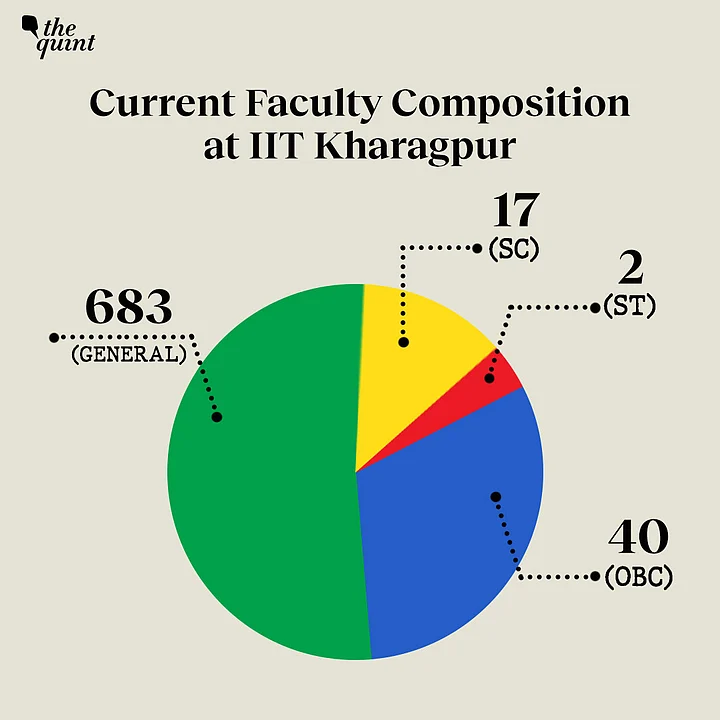
Source: RTI Response
(Image: The Quint/@Vibhushita Singh)
The student body said that this “blatantly violates constitutional provisions”, which apportion 15 percent seats for the SC community, 7.5 percent to ST community and 27 percent to OBC community in course admission and faculty recruitment.
In addition, it showed that of the total 45 departments at IIT Kharagpur, 43 do not have a single ST faculty member; 32 departments do not have an SC faculty and 23 departments do not have any faculty belonging to the OBC community.
In fact, there is no female ST faculty at IIT Kharagpur as of January this year, as per the RTI response.
Faculty recruitment in 2023 paints a sorry picture, with the elite institute hiring no faculty members from the ST community.
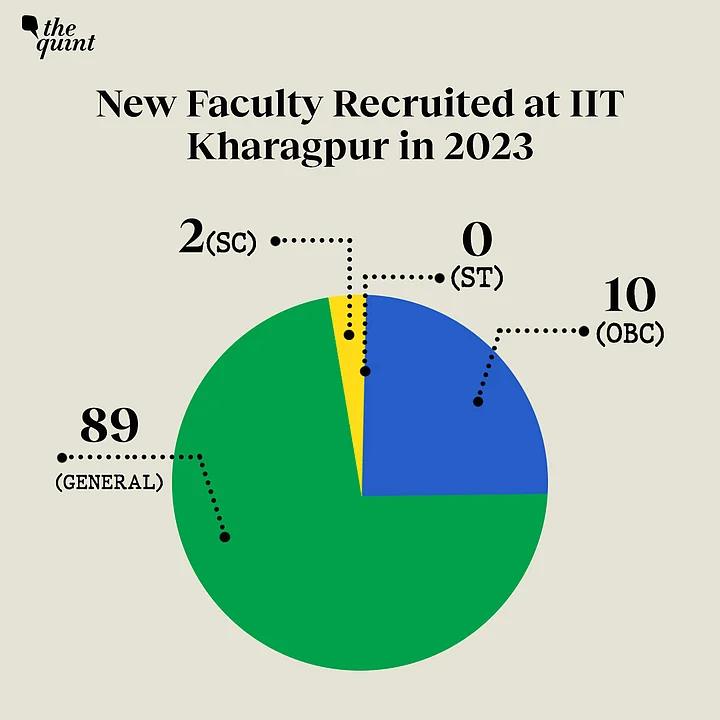
Source: RTI Response
(Image: The Quint/@Vibhushita Singh)
According to the RTI response, of the total 101 faculty members hired by IIT Kharagpur last year, only two belong to SC community while 10 belong to OBCs.
Similarly, in case of PhD admissions in 2023-24, of the 345 students IIT Kharagpur took in, 182 belonged to the General category. Meanwhile, 46 students (or 13.3 percent) belonged to the SC category, 9 students (or 2.60 percent) to the ST category and 82 students (or 23.7 percent) to the OBC category.
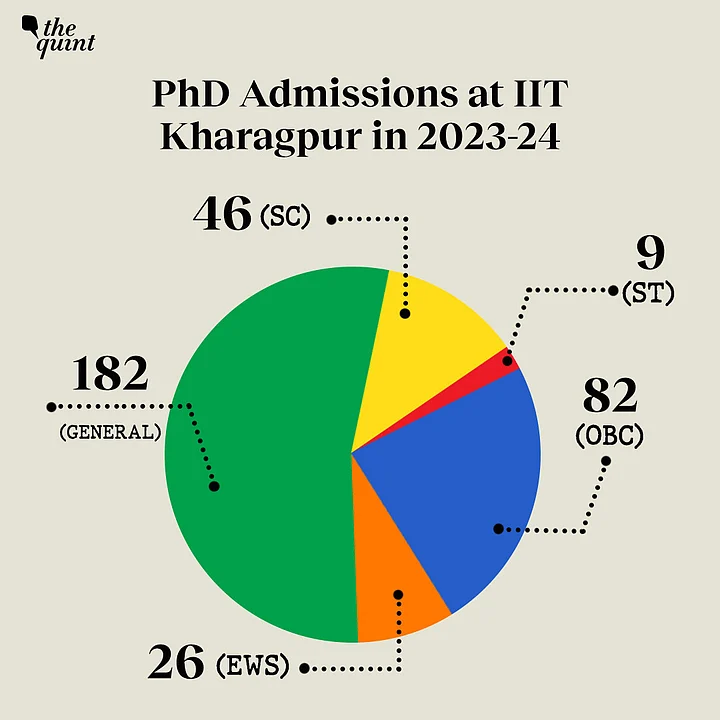
Source: RTI Response
(Image: The Quint/@Vibhushita Singh)
By doing so, IIT Kharagpur had denied 34 seats to PhD candidates belonging to marginalised communities, APPSC alleged. A member of the student body told The Quint that since IITs did not disclose the number of vacant seats for each category, they had calculated it based on the total intake.
“This is data from one IIT for one year. If you calculate it for 22 IITs for the last five years, the number of seats denied to SC, ST and OBC students will run into hundreds. Why are IITs not being held accountable for violating the reservation policy? What is preventing the courts from intervening?” an APPSC member lamented.
The Quint reached out to IIT Kharagpur for their response on allegations of violating the reservation policy and will update the story once they respond.
‘IIT Delhi Denied 132 Seats in 2023-24’
According to the RTI response, a copy of which was accessed by The Quint, of the total 32 departments at IIT Delhi, 25 did not have an ST student, 10 did not have an SCp student and six departments did not have an OBC student.
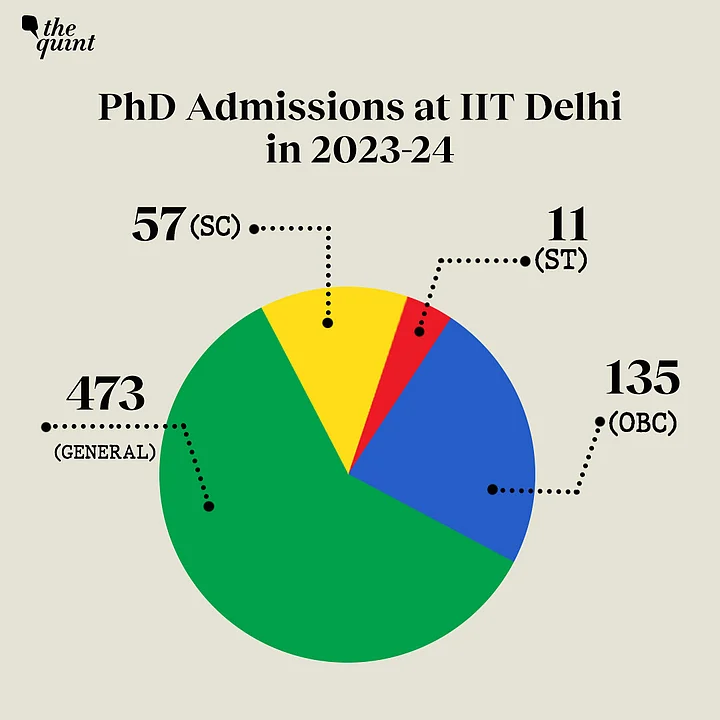
Source: RTI Response
(Image: The Quint/@Vibhushita Singh)
Of the total 676 PhD candidates selected in the academic year 2023-24, (473 or nearly 70 percent) belonged to the general category. Meanwhile, 57 (8.43 percent) students belonged to the SC community, 11 (or 1.62 percent) to the ST community and 135 (or 19.9 percent) to the OBC community, the RTI response indicated.
By doing so, IIT Delhi “denied a total of 132 seats” – 44 to SC students, 40 to ST students and 48 to OBC students – and violated the reservation policy, APPSC alleged in a post on X.
The number of women students among ST communities, paints a sorrier picture with only two women getting admission for PhD courses in IIT Delhi in 2023-24.
“More diversity democratises the campus. Those belonging to marginalised communities can find someone to reach out to. But at IITs, we are so heavily under-represented. If you’re an ST student at IIT Kharagpur or IIT Delhi, who do you reach out to? The system is designed to alienate you,” the APPSC member said, demanding IITs to take responsibility for the alarming number of student suicides.
Four students – Aayush Ashna, 20; Anil Kumar, 21; Panav Jain, 21 and Varad Nerkar, 23 —have lost their lives at the premier educational institute in the last eight months. Of them, two belonged to the Dalit community, while one belonged to the OBC community.
The Quint reached out to IIT Delhi for their response on allegations of violating the reservation policy and will update the story once they respond.
‘No ST Faculty in 14 Departments at IIT Kanpur’
“IIT Kanpur has violated reservation in faculty recruitment despite our consistent campaign and the govt ordering MMR (Mission Mode Recruitment),” APPSC claimed on the basis of another RTI response received on 29 January 2024.
According to the RTI response, a copy of which was accessed by The Quint, of the total 567 faculty members at IIT Kanpur as of January this year, 493 (nearly 87 percent) belong to the General category. Meanwhile, 24 (or 4 percent) faculty members are from SC community, 6 (or 1 percent) from ST community and 44 (or 7.7 percent) from the OBC community.
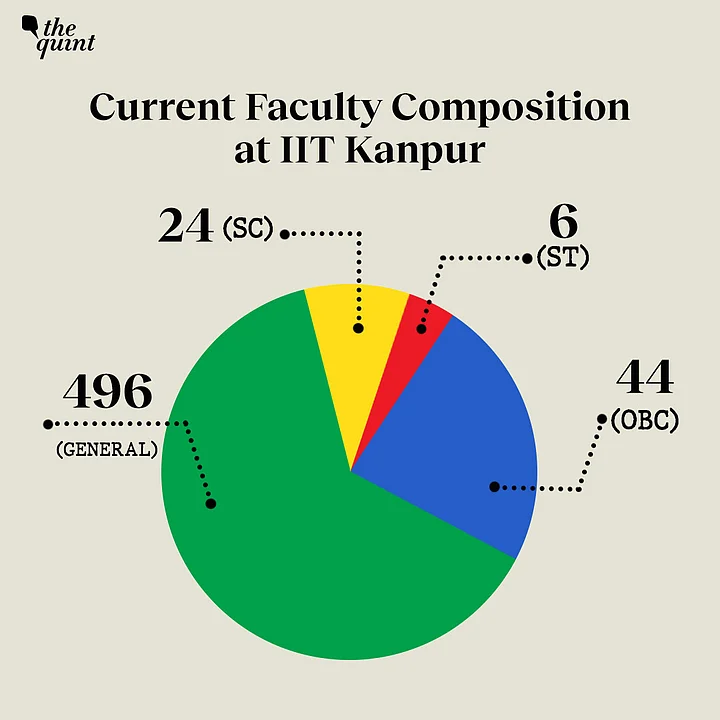
Source: RTI Response
(Image: The Quint/@Vibhushita Singh)
Since 1 January 2023, only two ST, two SC and five OBC faculty members have joined IIT Kanpur against 34 from the General Category.
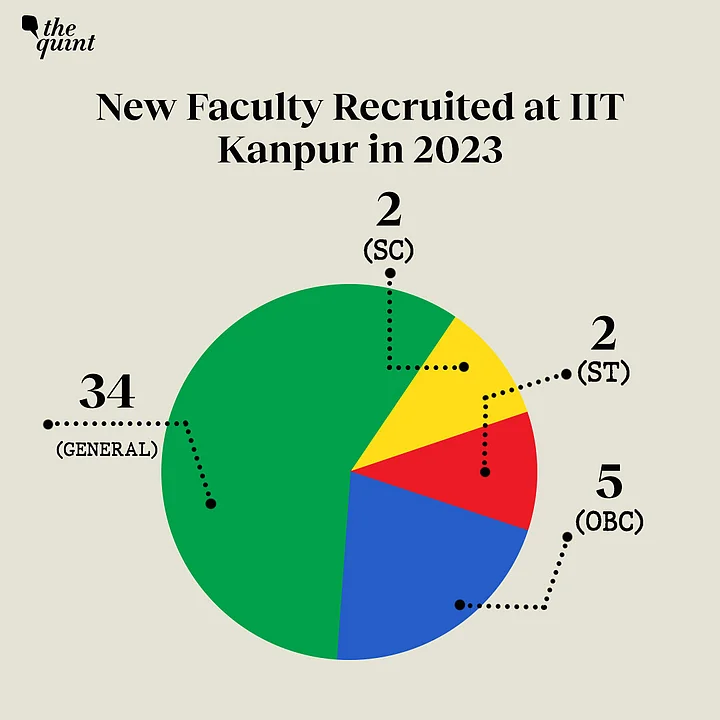
Source: RTI Response
(Image: The Quint/@Vibhushita Singh)
The data also shows that eight of the 19 branches at IIT Kanpur do not have any faculty member from the SC category, 14 don’t have an ST faculty, while three branches do not have any faculty member from the OBC category.
“MMR was essentially launched by the government to bridge the diversity deficit in PhD intake and faculty recruitment. But localised decisioning is such that biases are permeated at all levels of hiring,” Singh told The Quint.
The Quint reached out to IIT Kanpur for their response on allegations of violating the reservation policy and will update the story once they respond.
‘IIT Bombay Denied 80 Seats to SC, ST, OBC Students’
Of the 394 students that IIT Bombay took in 2023-24, 263 (or 66 percent) were from the General category. Meanwhile, 36 (or 9 percent) students belonging to SC community, 12 (or 3 percent) students belonging to ST community and 83 (20 percent) belonging to OBCs got admission at the elite institute.
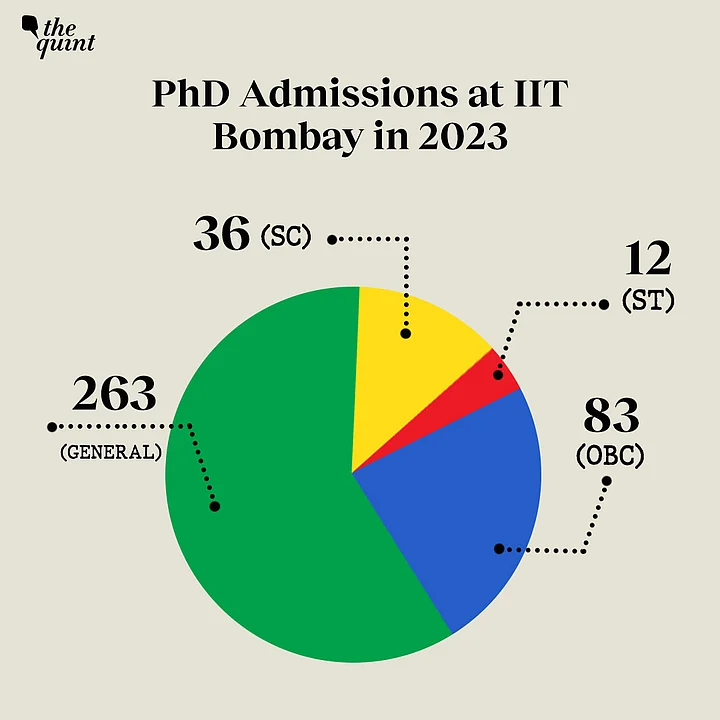
Source: RTI Response
(Image: The Quint/@Vibhushita Singh)
20 departments did not admit a single ST student in 2023, 11 did not admit any SC students and five did not admit any OBC students in the 2023-24 academic year at the PhD level.
Although IIT Bombay had, by its own admission, earmarked 168 seats for those belonging to the General category, RTI data shared by APPSC in September last year indicated that 263 seats – 95 seats over the prescribed limit – were given to General candidates.
On 9 September 2023, it said: “The Institute strives to maintain diversity in all aspects. We reiterate that all reservation norms are followed during admissions to all programmes and the reservation policy is followed in letter and in spirit.”
Singh explained, “A target year to achieve full parity for marginalised communities in faculty positions at IITs as well as IIMs should be announced. A centralised admissions and hiring agency to implement, monitor and achieve planned annual targets to accelerate diversity in PhD admissions and faculty recruitment would reduce bottlenecks due to biases at the institute level.”
Calling the SC/ST Cell at most IITs “dysfunctional,” Singh recommended a centralised grievance redressal agency to help resolve complaints of any caste-based discrimination in admissions, recruitment, promotions, etc. in the higher education institutes.
(At The Quint, we are answerable only to our audience. Play an active role in shaping our journalism by becoming a member. Because the truth is worth it.)







Comments
Post a Comment